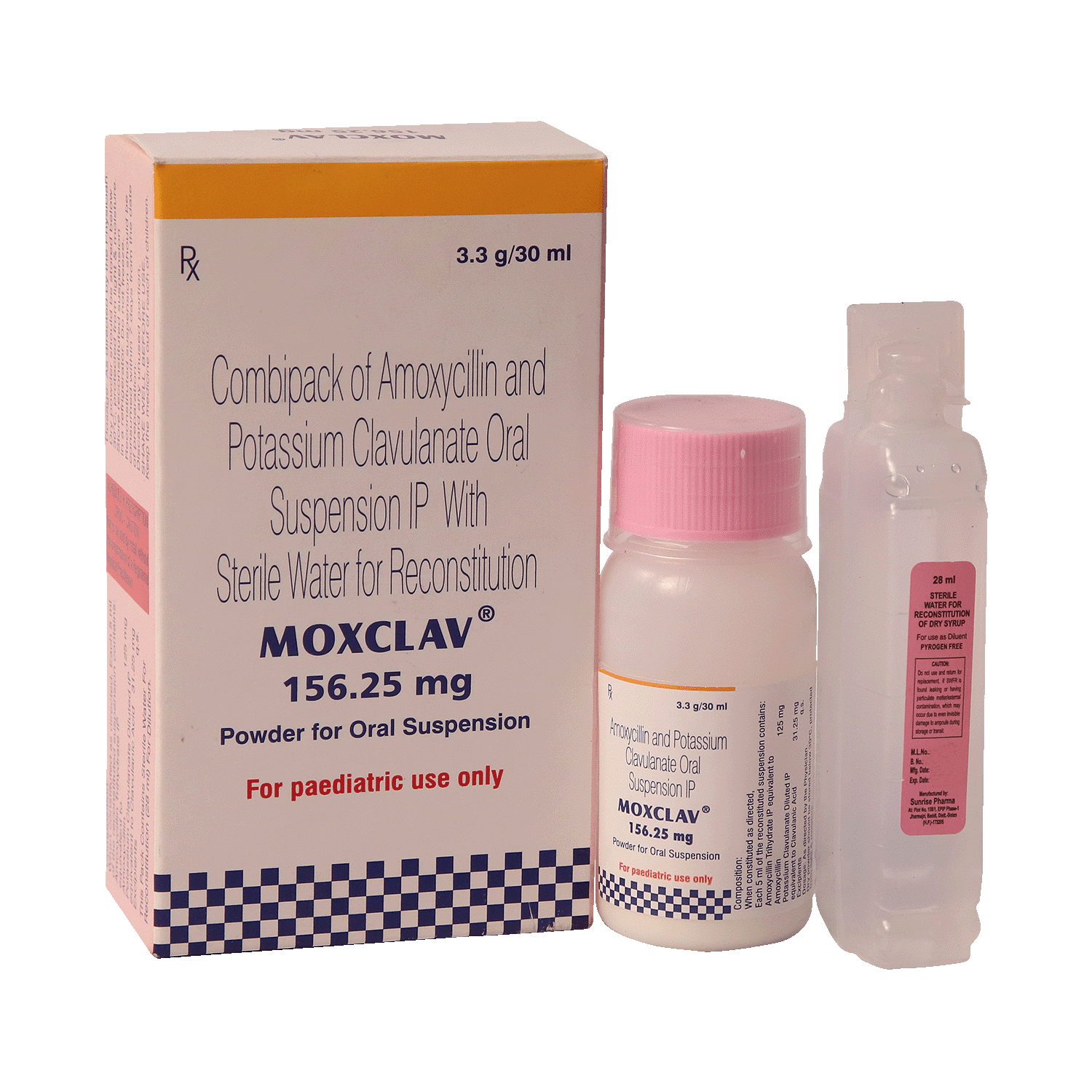
Sensiclav 125 mg/31.25 mg Syrup
Manufacturer
Macleods Pharmaceuticals Pvt Ltd
Salt Composition
Amoxycillin (125mg) + Clavulanic Acid (31.25mg)
Key Information
Short Description
Sensiclav 125 mg/31.25 mg Syrup is an antibiotic used to treat bacterial infections in various parts of the body, including the ear, nose, throat, chest, lungs, teeth, skin, and urinary tract.
Dosage Form
Syrup
Introduction
Sensiclav 125 mg/31.25 mg Syrup is an antibiotic medicine that helps treat bacterial infections of the ear, nose, throat, chest, lungs, teeth, skin, and urinary tract. It is capable of killing bacteria that have become resistant to other therapies and thus also helps treat tuberculosis that is resistant to other treatments. This medication contains two active agents, amoxycillin and clavulanic acid, which work together to prevent the formation of the bacterial cell wall and inhibit an enzyme produced by resistant bacteria. It is important to complete the entire course of antibiotics to prevent the bacteria from multiplying again or becoming resistant.
Directions for Use
Administer the prescribed dose of Sensiclav 125 mg/31.25 mg Syrup to your child as directed by the doctor. Ensure the full course is completed even if symptoms improve.
How it works
Sensiclav 125 mg/31.25 mg Syrup contains amoxycillin and clavulanic acid. Amoxycillin prevents the formation of the bacterial cell wall, essential for bacterial survival, while clavulanic acid inhibits beta-lactamase, an enzyme produced by resistant bacteria, making the combination effective against many infections.
Quick Tips
Your child must complete the entire course of antibiotics. Stopping too soon may cause the bacteria to multiply again, become resistant, or cause another infection. Your child may have a bitter taste in the mouth after taking Sensiclav 125 mg/31.25 mg Syrup. Eating citrus fruit or sipping plenty of water or fruit juice may help. Encourage your child to drink plenty of water in case diarrhea develops as a side effect. Never give Sensiclav 125 mg/31.25 mg Syrup unless prescribed by the doctor. Do not share your child’s medicine with anyone else even if they show similar symptoms. Do not use Sensiclav 125 mg/31.25 mg Syrup to treat common cold and flu-like symptoms caused by viruses. Never save medicine for future illnesses. It cannot be said whether the same medicine will work on future infections. Check the expiry date before giving Sensiclav 125 mg/31.25 mg Syrup to your child. Immediately discard all expired medicines. Stop Sensiclav 125 mg/31.25 mg Syrup immediately if your child develops an itchy rash, facial swelling, or breathing difficulty. Report to the doctor without any delay.
Related Medicines

Novaclav 125 mg/31.25 mg Syrup

Multiclav 125mg/31.25mg Syrup

Moxclav 156.25mg Syrup

Moxday CV Syrup

Ample Syrup

Moxy Plus Syrup

Augpen CV Syrup
Frequently asked questions
Can other medicines be given at the same time as Sensiclav 125 mg/31.25 mg Syrup?
It is essential to inform your child's doctor about any other medicines your child is taking before starting Sensiclav 125 mg/31.25 mg Syrup. Additionally, consult with your child's doctor before giving any medicine to your child, as Sensiclav 125 mg/31.25 mg Syrup can interact with other medicines or substances.
Can I get my child vaccinated while on treatment with Sensiclav 125 mg/31.25 mg Syrup?
Antibiotics, including Sensiclav 125 mg/31.25 mg Syrup, usually do not interfere with vaccine ingredients or cause adverse reactions in children who have recently been vaccinated. However, it is recommended to wait until your child has recovered from the illness before getting them vaccinated.
Which lab tests may my child undergo while taking Sensiclav 125 mg/31.25 mg Syrup on a long-term basis?
During prolonged therapy with Sensiclav 125 mg/31.25 mg Syrup, your child's doctor may monitor kidney and liver function tests periodically to ensure your child's condition remains stable.
Can I give a higher than the recommended dose of Sensiclav 125 mg/31.25 mg Syrup to my child?
No, giving a higher dose of Sensiclav 125 mg/31.25 mg Syrup than recommended can increase the risk of side effects. If your child's symptoms worsen, consult your doctor for re-evaluation and guidance.
Can I stop giving Sensiclav 125 mg/31.25 mg Syrup to my child when the symptoms are relieved?
No, do not stop giving Sensiclav 125 mg/31.25 mg Syrup to your child unless the full course of treatment is complete, even if symptoms improve. The infection may not be fully cured, and continuing the medication can help prevent relapse.
Can the use of Sensiclav 125 mg/31.25 mg Syrup cause diarrhea?
Yes, Sensiclav 125 mg/31.25 mg Syrup may cause diarrhea due to its antibiotic properties, which can disrupt the balance of helpful bacteria in your child's stomach. If your child experiences diarrhea, encourage them to drink plenty of fluids and consult your doctor if symptoms persist or worsen.
Do all viral common colds result in secondary bacterial infection?
No, most viral infections do not lead to secondary bacterial infections. In fact, giving antibiotics for viral infections can increase the risk of side effects. Use antibiotics only after consulting with your child's doctor.
The mucus coming out of my child's nose is yellow-green. Is it a sign of a bacterial infection?
Yellow or green mucus in the nose does not necessarily indicate the need for antibiotics. During a common cold, mucus can thicken and change color, and symptoms often last for 7-10 days.
Is there any sign which shows that my child needs immediate medical attention?
Seek immediate medical attention if your child experiences severe allergic reactions (breathing difficulties, skin rashes), gastrointestinal infections (diarrhea), or liver damage (weakness, paleness, vomiting). Although rare, these side effects are serious and require prompt medical attention.


